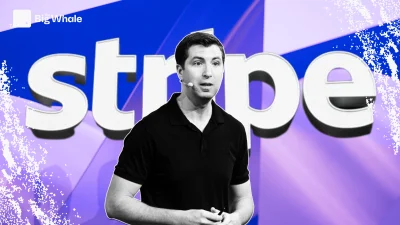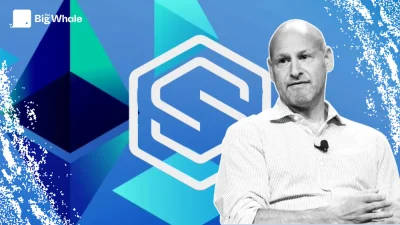The Big Whale: When we think of Casino, we think of supermarkets and shops, but not the web3. What prompted you to get involved?
Stéphanie Zolesio: Yes, it may come as a surprise, but in reality, it's very logical for Casino to be present in this universe. Casino's business, and more specifically Casino Immobilier et Innovation which I look after, is to create spaces for our brands, Casino, Franprix, Monoprix and Cdiscount, to express themselves.
We have a strong presence in both the physical and digital worlds, so it seemed essential to go out and test and explore this new hybrid world.
When did Casino start to take an interest in web3?
I remember it very well, it was two years ago. I had asked my teams to present innovation topics to me at a meeting and that's when I was told about "tokenisation", and to be honest I didn't understand a thing at the time.
That's often the case the first time...
But as I'm quite curious, I wanted to understand. So the team organised meetings with players in the ecosystem, and fairly quickly we realised that there was real potential around the metaverse, NFTs and cryptocurrencies. Just a few months after these initial meetings, we bought our first plots in The Sandbox.
Casino manages web3 in-house via its real estate and innovation subsidiary. Why is this? What does this have to do with real estate?
It's only weird for those who have decided that web3 is only digital. Twenty years ago, some people said that the Internet was the preserve of marketing, but that's not the case. Today, the Internet concerns all business lines, and the same is true for web3.
We are convinced that tokenisation is going to have a very significant impact in real estate. Splitting up the ownership of property assets among different owners already exists with real estate investment trusts (SCPIs). Why not do it digitally through blockchain?
What would be the point of tokenising your shops?
My teams look after both shops and land on behalf of the group and also on behalf of third parties.
We are specialists in these areas, and by offering a tokenisation platform with property services, we can position ourselves to support customers in physical and digital investment.
What's holding up the launch of such a platform?
We're making good progress on the project. It's just a matter of weeks.
In the meantime, you've already done a lot on the retail side with Monoprix and Leader Price. What results have you drawn from this?
The Sandbox organised a French Weeks operation in 2022 in which Monoprix and Leader Price took part. For a fortnight, users had an avatar in The Sandbox with quests to complete. In the quests, there were QR codes and points to be won that could be used directly in shops.
Last year we also launched a collection of NFTs distributed free of charge to Leader Price club members. There were 10 families of NFTs representing retail professions.
What's the point of this kind of collection?
They're loyalty tools. Take the case of the NFT vigneron distributed to members of the Leader Price club. If you have an NFT vigneron, you can get discounts on the bottles you buy.
This also works with the deliveryman. This NFT allows you to have free deliveries for a certain period of time, and above all, you can exchange these NFTs with their benefits. This type of functionality was not possible with the traditional web.
In addition to your experience for the general public, your subsidiary Cdiscount has used NFTs to track its large parcels. What was the result?
Savings! For large parcels, especially the more expensive ones, we had breakage or loss, which we could no longer accept. In logistics, you have a slip that is filled in at each stage. Sometimes you have ten pallets, and at the next stage you only have nine...
Thanks to blockchain and the Ownest system, we have reversed responsibility: you no longer have to fill in a document, but use an NFT which acts as proof of responsibility. If you have the NFT, you are responsible for the goods and it's by passing it on that you free yourself from that responsibility.
It's a bit like the NFT that nobody wants to have?
Exactly. We now triple-check the goods. There's no better example to show that an NFT has a real impact.
For the moment, this system works with large parcels. Could it be developed for other chains?
Technologically, it's possible.
Many companies are wondering where to start with web3. Obviously, Casino has decided to take a very broad approach, without focusing on a single activity. Isn't that too complicated?
We've chosen to do a lot of things at the same time because web3 is still in its infancy and it allows us to test new uses. We need to test the marketing angle, the management angle, the commercial angle...
When companies launch web3 projects, they make a lot of noise, even though the impact is generally fairly limited. Is this the case for you?
The experience of French weeks in The Sandbox is the perfect inverse example. We were surprised by the number of people who came, and especially by the average length of their gaming session. This was longer than the time people usually spend on our online site!
The conclusion is that we manage to capture people and that they are even more engaged. In The Sandbox, the engagement rate was ten times higher than what we usually have on social networks.
You may have very little engagement on your social networks...
No, we have a very good engagement rate, but it's true that the proportion of players in The Sandbox who joined the merchant site was much higher than what we do on traditional media. As part of the operation with Leader Price, 50% of people used their NFTs to carry out transactions.
How do you explain this success? Was it the immersive dimension that played a part?
Of course, there is the immersive dimension. At Monoprix, we installed kiosks where you could physically buy NFTs from the "RudeKidz" collection in a number of Monoprix shops.
The operation lasted two weeks. When you bought an NFT, you got physical products, with a subscription to Monoprix that gave 10% off their shopping.
At the end of this operation, we organised a party in one of the Monoprix shops involved in the operation (Monoprix Montparnasse in Paris, editor's note), and we were overwhelmed by the event. We had to kick people out at 10.30pm. This operation was very instructive because it showed that activating communities via NFTs worked very well.
What are the next steps?
We're working on scaling up these experiments.
After two years of testing, what interests you about these technologies?
Very clearly, decentralisation. It's interesting to see how, as a brand, we can totally turn traditional marketing on its head, where we are obliged to know everything about the customer, their gender, age, sociology.
Our customers no longer want us to know everything about them and for them to be the product. Things are changing, and blockchain can provide a response to these new challenges.
How do you strike the right balance between the business dimension and what customers want?
That's the whole learning curve we've started to go through. There's bound to be some frustration because on some transactions we'll be blind, we won't have the right information, but we have to learn to work differently.
Now we're learning to look at the wallets, to look at the transactions, to track the NFTs that can move from one wallet to another, which lets us imagine all sorts of possible uses. With web3, we're no longer tracking customers, but buying paths.
To make progress on these issues, we also need to change the culture internally. How do you do this?
We started by hiring generalists, people who were curious about these subjects, and then we gradually recruited more specialised people.
How many people do you have in-house?
We have a small team with five people dedicated to the subject of web3. This team can help all brands with their strategy and their choice of partners, both technical and marketing.
How do you acculturate people internally?
We set up a Web3 Academy at the beginning of the year. The Web3 Academy is a programme of different modules designed to help people understand what web3 is all about. At the end of the course, there is a certification system with a diploma in the form of an NFT and even a ceremony in the metaverse.
Who is concerned by this training?
All Casino employees. Our aim is to ensure that these issues are not just marketing issues. Our role is to make people aware that, like the Internet 20 years ago, web3 is going to have a considerable impact on our business and our relationship with customers.
The smashing arrival of Facebook, now Meta, in web3 has prompted many companies to position themselves on subjects related to cryptos and NFTs. Is this also the case for you?
We started to take an interest before Meta's arrival. Our first acquisitions in the metaverse date back to December 2021.
Meta launched in October 2021...
We made the acquisitions in December, but it started before then. We had to know where to buy and how. There are also questions of governance. Who creates the wallet and who has access to it? A deal like this, with its accounting implications, can't be done in a few days, especially for a listed group.
How did you manage the fact that you were interested in cryptos while being a listed group?
We had to prepare the deal well and convince people internally, particularly at the highest level. We explained what our vision was and where our ambitions lay.
For the past year, it's been much more complicated to move into crypto. Wasn't there too much hype?
I remember very well the early days of the Internet when we were told that it wasn't finished, that no one was ready to buy items on a computer, that paying by bank card remotely was never going to work.... It's all well known!
After testing all these technologies, what was the most complicated thing to get to grips with?
The hardest part was sorting out the subjects, without getting too lost, because the days are only 24 hours long. When we launched in 2021, it was all the rage around NFTs, there were lots of projects, lots of experts who, for some, had only been there for a few weeks...
I have a fairly simple technique for sorting things out: at each meeting, I ask for the names of three other people to follow on web3 topics. The human recommendation worked very well. The second difficulty was sorting out our projects, because once we had identified all the use cases, we had to make choices 😏.
There's another important project for Casino, and that's Lugh and his euro stablecoin, the EURL. What's the current status?
This is a very important project because it was the first time a traditional company had launched a stablecoin.
Two years after the launch, the EURL's reserve is just over €6 million. We could have imagined a little more. Why hasn't it taken off?
I think you're being rather harsh. Volumes have risen sharply in recent weeks. We are in the process of testing and changing parameters to further increase the use of EURL.
How can we ensure that EURL is used more?
There is the question of use cases and availability on platforms.
Wasn't the decision to make the EURL available only on Coinhouse a mistake?
I still think it was a good decision. What is certain is that we need to continue to make it more accessible. We've started to do that with other platforms and other digital portfolios.
When Lugh was launched, Casino had given assurances that there would be other retail players in the project. Where do you stand with this?
We are discussing it with other players. It's just taking time.
Could EURL be integrated more directly into the Casino environment, or will it remain a product of the crypto universe?
The vision we have is to have a global ecosystem that embraces the web3 philosophy. We need to adapt as we go along. It makes no sense to be able to send EURLs to everyone tomorrow. We need to move in gradually, but the EURL is clearly a priority for Casino.









